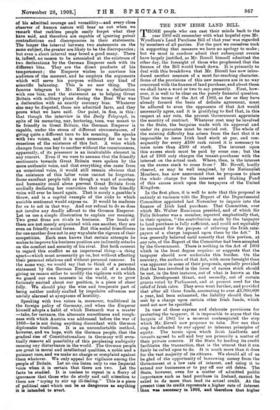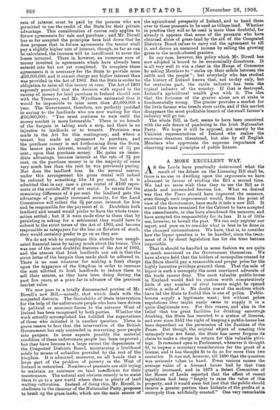THE NEW IRISH LAND BILL.
THOSE people who can cast their minds back to the year 1903 will remember with what hopeful eyes Mr. Wyndham's Land Purchase Bill of that year was regarded by members of all parties. For the part we ourselves took in supporting that measure we have no apology to make ; but we must in candour admit that subsequent events have largely justified, as Mr. Birrell himself admitted the other day, the foresight of those who prophesied that the finance of the Bill would break down. It is primarily to deal with this breakdown that Mr. Birrell has now intro duped another measure of a most far-reaching character. Some of the provisions of this new measure are in no way concerned with the finance of land purchase, and about these we shall have a word or two to say presently. First, how- ever, it is well to be clear on the purely financial question. That the terms of the Act of 1908, so far as they have already formed the basis of definite agreement, must be adhered to even the opponents of that Act would necessarily agree, and it is gratifying to find that, in this respect at any rate, the present. Government appreciate the sanctity of contract. Whatever cost may be involved to the State, the bargains made with its approval and under its guarantee must be carried out. The whole of the existing difficulty has arisen from the fact that it is impossible to issue Irish land stock at par, and con- sequently for every £100 cash raised it is necessary to issue more than £100 of stock. The interest upon this excess stock must be paid by some one ; but the Act of 1903 only charges the tenant-purchaser with the interest on the actual cash. Where, then, is the interest on the excess stock to come from ? Mr. Birrell, loudly cheered, as may be well imagined, by the Nationalist Members, has now announced that he proposes to place the whole charge for the interest and Sinking Fund of this excess stock upon the taxpayers of the United Kingdom.
In the first place, it is well to note that this proposal it entirely at variance with the Report of the Departmental Committee appointed last November to inquire into the finance of Irish land purchase. That Committee, over which Mr. Walter Runciman presided, and of which Sir Felix Schuster was a member, reported emphatically that; in their opinion, " the contribution made by the taxpayer to land purchase is fully sufficient, and could not equitably be increased for the purpose of relieving the Irish rate.- payers of a charge imposed upon them by the Ad." It was generally believed until recently that this portion, at any rate, of the Report of the Committee had been accepted by the Government. There is nothing in the Act of 1903 which in the least degree require; or suggests that the taxpayer should now undertake this burden. On the contrary, the authors of that Act, with more foresight than was apparent in some of their proposals, specially provided that the loss involved in the issue of excess stock should be met, in the first instance, out of what is known as the Irish Development Grant, and secondly, out of certain grants voted by Parliament, and at present used for the relief of Irish rates. They even went further, and provided that after all these funds, awouutiug to over £1,000,000 a year, had been exhausted, the liability should then be met by a charge upon certain other Irish funds, which need not now be specified.
In view of these express and elaborate provisions for protecting the taxpayer, it is impossible to argue that the bargain of 1903 for a momeut contemplated the step which Mr. Eirrell now proposal to take. Nor can that step bidefended. by any appeal to inherent principles of equity. The terms upon which Irish landlords and tenants agreed to sell and buy are primarily a matter of their private concern. If the State by lending its credit facilitates the transaction, that is the utmost that it can fairly be called upon to do. It is much more than it does for the vast majority of its citizens. We should all of us be glad of the opportunity of borrowing money from the Government at a low rate of interest, and using it to extend our businesses or to pay off our old debts. The State, however, even for a matter of admitted public importance such as land purchase in Ireland, cannot be asked to do more than lend its actual credit. At the present time its credit represents a higher rate of interest was necessary in 1908, and therefore that higher rate of interest must be paid by the persons who are permitted to use the credit of the State for their private advantage. This consideration of course only applies to future agreements for sale and purchase ; and Mr. Birrell has so far accepted the principles here laid down that he does propose that in future agreements the tenant shall pay a slightly higher rate of interest, though, as far as can be calculated, the increase will be insufficient to cover the losses incurred. There is, however, an immense sum of money involved in agreements which have already been entered into but not yet completed. To complete these agreements it is necessary for the State to provide some £50,000,000, and it cannot charge any higher interest than was provided in the Act of 1903. But the State is under no obligation to raise all this money at once. The Act of 1903 expressly provided that the decision with regard to the raising of money for land purchase iu Ireland should rest with the Treasury, and Mr. Wyndham estimated that it would be impossible to raise more than £5,000,000 a year. The Government, therefore, arc perfectly justified in saying to the landlords who are now waiting for this £50,000,000 : " You must continue to wait until the money market is more favourable." There is no breach of the bargain in taking such a step, and there is no injustice to landlords or to tenants. Provision was made in the Act for this contingency, and where a tenant has made an agreement to purchase, and the purchase money is not forthcoming from the State, the tenant pays interest, usually at the rate of 31 per cent.; upon that purchase money. He gains an imme- diate advantage, because interest at the rate of 3i per cent. on the purchase money is in the majority of cases very much leas than the rent he was previously paying. Nor does the landlord lose. In the normal course, under this arrangement his gross rental will indeed be reduced by something like 14 per cent., but it is admitted that in any case a gross rental of £100 repre- sents at the outside £90 of net rental. In return for the remaining difference of 4 per cent. the landlord gets the advantage of a greatly increased security, for the Land Commission will collect the 3i per cent. interest for him and be responsible for the payment of it. Doubtless both landlord and tenant would prefer to have the whole trans- action settled ; but if it were made clear to them that by persisting in asking for a settlement they would have to submit to the strict terms of the Act of 1903, and become responsible as ratepayers for the loss on flotation of stock, they would certainly prefer to go on as they are.
. We do not wish to complicate this already too compli- cated financial issue by saying much about the bonus. This was one of the most doubtful features of the Act of 1903, and the utmost that Irish landlords can ask is that the strict letter of the bargain then made shall be adhered to. There is no case whatever for making a fresh charge upon the taxpayers of the kingdom in order to increase the sum allotted to Irish landlords to induce them to sell their estates, as they have been doing during the past five years, at a price far in advance of the previous market value.
We now pass to a totally disconnected portion of Mr. Birrell's new Bill,—namely, that which deals with the congested districts. The desirability of State intervention for the help of the unfortunate people who have been driven by political or economic forces to the extreme West of Ireland has been recognised by both parties. Whether the work actually accomplished has fulfilled the expectations of those who initiated it is another question. There is grave reason to fear that the intervention of the British Government has only succeeded in converting poor people into paupers. In some aspects possibly the material condition of these unfortunate people has been improved ; but they have become to a large extent the dependents of the Congested Districts Board, maintaining a. livelihood solely by means of subsidies provided by the rest of the kingdom. It is admitted, moreover, on all hands that a large part of the problem of poverty in the West of Ireland is untouched. Numbers of peasants are still trying to maintain an existence on laud insufficient for their maintenance. The natural and obvious remedy is to assist them to go to a new world where there is plenty of land waiting cultivation. Instead of doing this, Mr. Birrell, in obedience to the clamour of the Nationalist Party, proposes to break up the grass-lands, which are the main source of the agricultural prosperity of Ireland, and to hand them over to these peasants to be used as tillage-land. Whether in practice they will so be used is more than doubtful, for already it appears that some of the peasants who have obtained slices of grass-land by the aid of the Congested Districts Board refuse to carry out the agreement to till it, and derive an unearned income by selling the growing grass to the much-abused graziers.
In any case, however, the policy which Mr. Birrell hag now adopted is bound to be economically disastrous. It is all very well to win a cheer in the Rouge of Commons by asking Members to " make up their minds between the cattle and the people "; but everybody who has studied the history of Ireland knows that, not to-day only, but for centuries past, the cattle industry has been the typical industry of the country. If that is destroyed, Ireland's agricultural wealth goes with it. The idea that the fortunes of the grazier alone are at stake is fundamentally wrong. The grazier provides a market for the little farmer who breeds store cattle, and if this market disappears the most profitable branch of the small firmer's industry will go too.
The whole Bill, in fact, seems to have been conceived with the sole desire of pandering to the Irish Nationalist Party. We hope it will be opposed, not merely by the Unionist representatives of Ireland who realise the • economic disasters threatened, but also by all English Members who appreciate the supreme importance of observing sound principles of public finance.



















































 Previous page
Previous page